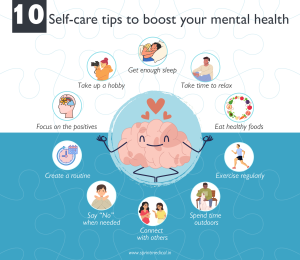Introduction
In today’s fast-paced world, where everyone seems to be juggling multiple responsibilities, it’s easy to forget about our mental well-being. Yet, mental health is just as important as physical health, and taking care of your mind is essential for living a happy, fulfilling life. Mental health challenges are common, but the good news is that there are plenty of ways to improve and maintain mental wellness.
Whether you’re feeling stressed, anxious, or simply want to ensure you’re taking good care of your emotional well-being, this article will explore practical tips and strategies that can help you lead a mentally healthier life. From small changes in your daily routine to larger shifts in mindset, improving your mental health is something that anyone can do, regardless of age or background.
Mental Health Matters: Tips for a Healthier Mind

Why Mental Health Matters
Mental health refers to your emotional, psychological, and social well-being. It affects how you think, feel, and act, influencing how you handle stress, relate to others, and make choices. Mental health problems are widespread, with millions of people worldwide experiencing conditions such as anxiety, depression, and stress. But the good news is that just as you take steps to improve physical health, you can also take steps to improve your mental health.
Taking care of your mental health helps you handle life’s challenges, build better relationships, and improve your overall quality of life. When your mental health is in good shape, you’re more likely to be productive, happy, and resilient, even when things don’t go as planned.
1. Practice Self-Care Regularly
One of the simplest but most effective ways to support your mental health is through regular self-care. Self-care involves any activity that helps you relax, recharge, and improve your mood. This can include activities like:
- Taking a warm bath or shower
- Going for a walk in nature
- Reading a book
- Listening to music
- Meditating or practicing deep breathing exercises
- Journaling your thoughts and feelings
When you make time for self-care, you give your mind a break from stress and allow it to reset. Even small acts of kindness toward yourself, like getting enough sleep, staying hydrated, and eating nutritious meals, can go a long way in boosting your mental well-being.
2. Stay Active: Exercise for the Mind and Body
Physical activity isn’t just good for your body—it’s fantastic for your mind as well. Exercise is known to release endorphins, which are chemicals in your brain that act as natural mood boosters. Regular exercise can help reduce symptoms of anxiety, depression, and stress.
You don’t have to start with an intense workout routine. Even a short walk each day or a gentle yoga session can make a big difference. Find an activity that you enjoy, whether it’s swimming, cycling, dancing, or simply stretching. The key is consistency—getting active on a regular basis will help keep your mind sharp and uplifted.
3. Connect with Others
Human connection is a crucial part of maintaining good mental health. Having supportive relationships can help you manage stress, improve your mood, and feel more connected to others. Loneliness, on the other hand, can contribute to feelings of sadness and anxiety.
Whether it’s spending time with friends and family, joining a club, or reaching out to someone for support, staying socially connected can boost your mental well-being. If you’re struggling, don’t hesitate to talk to a loved one or seek professional help. Sometimes, just talking about what’s on your mind can make a huge difference.
4. Manage Stress Effectively
Stress is a part of life, but when it becomes chronic, it can take a toll on your mental health. Learning to manage stress effectively is key to maintaining your emotional well-being. Here are a few stress-management techniques to try:
- Mindfulness Meditation: Taking a few minutes each day to practice mindfulness can help you stay present and reduce feelings of overwhelm.
- Time Management: Organize your day, set priorities, and break tasks into manageable steps. This can prevent you from feeling stressed and overwhelmed.
- Breathing Exercises: Deep breathing can help calm your nervous system and reduce feelings of anxiety. Try inhaling for a count of four, holding for four, and exhaling for a count of four.
By incorporating stress-management techniques into your routine, you can handle the challenges that come your way with greater ease.
5. Get Enough Sleep
Sleep and mental health are closely linked. When you don’t get enough rest, it can affect your mood, energy levels, and ability to focus. Chronic sleep deprivation can contribute to mental health conditions like anxiety and depression.
Aim for 7-9 hours of quality sleep each night. To improve your sleep habits, try to:
- Establish a consistent bedtime routine.
- Create a comfortable sleep environment (dark, quiet, and cool).
- Avoid screens (phones, computers, TVs) at least 30 minutes before bed.
- Practice relaxation techniques, such as reading or listening to calming music, to unwind before sleep.
Getting enough rest will allow your mind and body to recover, helping you face each day with more energy and a positive outlook.
6. Focus on Positive Thinking
The way we think can significantly impact our mental health. Negative thinking patterns, such as focusing on what’s going wrong or worrying about the future, can contribute to feelings of anxiety and depression. On the other hand, cultivating a positive mindset can help you feel more hopeful and resilient.
To shift your thinking, try these strategies:
- Practice gratitude: Each day, take a moment to write down things you’re grateful for. This simple habit can help you focus on the positive aspects of your life.
- Challenge negative thoughts: When you catch yourself thinking negatively, ask yourself if the thought is realistic or helpful. Replace negative thoughts with more balanced, positive ones.
- Visualize success: Take a few minutes each day to imagine achieving your goals or overcoming challenges. This can boost your confidence and motivate you to take action.
By focusing on positive thinking, you’ll begin to train your mind to look for solutions rather than problems, which can lead to better mental health over time.
7. Seek Professional Help When Needed
If you’re struggling with mental health issues such as anxiety, depression, or overwhelming stress, it’s important to seek professional support. Talking to a therapist, counselor, or psychologist can provide you with tools and strategies to manage your mental health more effectively. Therapy can also offer a safe space to explore your feelings and gain perspective on challenges you may be facing.
There’s no shame in asking for help—mental health professionals are trained to guide you through difficult emotions and help you develop healthier coping mechanisms.
Conclusion
Taking care of your mental health is just as important as taking care of your physical health. By implementing simple but effective strategies, such as practicing self-care, staying active, managing stress, and focusing on positive thinking, you can improve your emotional well-being and live a more balanced life. Remember, mental health is a journey, and it’s okay to take small steps toward improvement. If you’re ever struggling, don’t hesitate to reach out for help. Your mental well-being matters, and by prioritizing it, you’re investing in a happier, healthier future.












